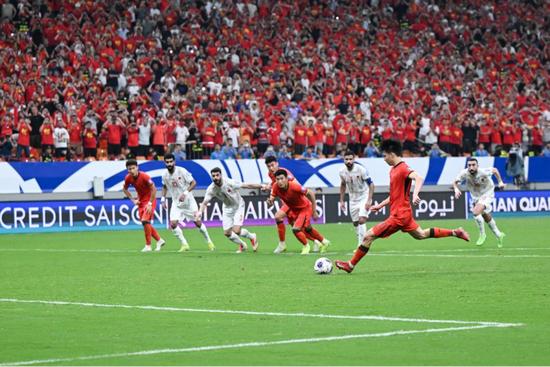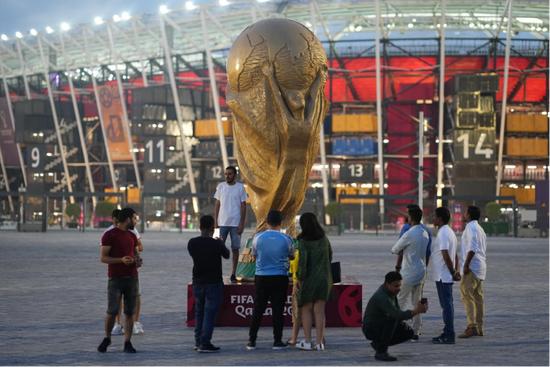

Recently, several Japanese media outlets reported that the Japan Football Association publicly expressed its desire to bid for the 2046 World Cup.
The report revealed that the Japan Football Association also hopes to co-host with several neighbors of the Asian Football Confederation, including but not limited to China, South Korea, Australia, and Indonesia.
For the Japan Football Association, this move would mark the first time in 44 years since the 2002 World Cup in Korea and Japan that Japan has hosted a World Cup again.
This news has once again stirred the nerves of Chinese fans.
Supporters argue that it is an indirect way for the national team to stand on the World Cup stage by relying solely on their own strength; however, opponents believe that given China’s current organizational capabilities and rich experience in hosting large events, it could be feasible to do so independently.
As of the time of publication, the Chinese Football Association has not issued any specific comments regarding the proposal to co-host the World Cup.
Why is Japan so keen on hosting the World Cup?
Japan’s repeated announcement of its desire to host the World Cup was already included in its long-term planning.
International football expert and Ballon d’Or judge Luo Ming told China Newsweek that the proposal by the Japan Football Association for the co-hosting of the 2046 World Cup is a crucial part of its long-term strategy.
Luo Ming explained that as early as 2005, the Japan Football Association released the “2005 Declaration,” clearly setting mid- and long-term goals for Japanese football.
This “2005 Declaration” includes two important milestones: first, in 2015, when the national team ranks among the top 10 globally and the football population reaches 5 million; and second, by 2050, when the football population reaches 10 million, and Japan hosts and wins the World Cup championship.
In the past, Japan’s men’s national football team only briefly reached the 9th position in the world rankings between February and March of 1998, marking a historical high. According to the latest FIFA rankings, Japan is ranked 17th in the world. Regarding their World Cup performance, Japan’s men’s national football team has never advanced beyond the round of 16 in the knockout stages after qualifying from the group stage multiple times.
Some fans believe that reaching the quarter-finals in the World Cup is already the ceiling for Japan’s men’s national football team. If we judge by the “Declaration of 2005,” the Japanese Football Association, which hasn’t met its “KPI” at any of the first time points, would essentially be dreaming of winning the World Cup by 2050.
However, some fans argue that Japan’s ambition to host the World Cup in 2050 and win it is laudable, but even if this ultimate goal cannot be achieved, at least every step taken is grounded, and the commitment is evident without signs of changing plans or wavering during the process.
From a practical perspective, according to FIFA regulations, countries hosting the World Cup must not host it in the same continent for two consecutive years. After Saudi Arabia hosted the World Cup in 2034, the year 2046 might just be the right time for the World Cup to return to Asia. Therefore, the Japanese Football Association’s bid for the 2046 World Cup has received support from figures within the Japanese football community.
Firstly, the current chairman of the Japanese Football Association, Hiroshi Nakamura, publicly confirmed his intention to lead the bid for the 2046 World Cup. Secondly, this move also received public support from the current head coach of Japan’s men’s national football team, Hajime Moriyasu.
Hiroshi Nakamura stated that since the 2002 World Cup, Japan has not hosted a major global football event again, and now is the time to showcase its hosting capabilities. Hajime Moriyasu also mentioned, “Home field advantage can increase your chances of winning.”
However, Japan’s joint bid for the 2046 World Cup seems somewhat wishful thinking at present.
Currently, only the South Korean Football Association has publicly responded. The Chinese Football Association, along with the Australian, Thai, and Singaporean associations, have not issued an official statement.
A representative from the South Korean Football Association stated to the public: “Whether within the South Korean Football Association or between it and the Japanese Football Association, there has been no discussion about jointly bidding for the World Cup.”
What is the reason behind the joint bid?
In Luo Ming’s view, Japan’s proposal for a joint bid stems from the fact that “the plan in 2005 could not keep up with current changes.”
Throughout the century-long history of the World Cup, the scale of the event has continuously expanded, and the costs for hosting have soared. The threshold for a single country to bid for the World Cup has become increasingly high, and the burden has grown heavier. Whether it’s Europe, America, or Asia, joint bidding has essentially become a trend.
The 2026 World Cup will be co-hosted by the United States, Canada, and Mexico, marking the first time since 32 teams were expanded to 48 teams in World Cup history. Luo Ming commented: “Considering the comprehensive national strength of the United States, hosting the World Cup alone would be entirely feasible. However, the United States still chose to co-host with Canada and Mexico.”
For the 2030 World Cup, Spain, Portugal, and Morocco will co-host, with Uruguay, Argentina, and Paraguay taking over the opening ceremony and the first three matches.
The 2034 World Cup will return to Asia, where “not short of money” Saudi Arabia opted for independent hosting. That same year, Saudi Arabia will also host the Asian Games, indicating its significant investment in sports.
Zhang Bin, founder of Daya Sports, believes that there is a particularly awkward aspect in the Japanese media report regarding Japan’s hope to co-host the World Cup with several Asian countries: Japan’s Football Association wishes to lead the bid for the 2046 World Cup, expressing a desire to host the final at the Tokyo National Stadium, yet seems to also wish to avoid excessively heavy costs for hosting.
“To some extent, this also falls under the category of ‘both and more’. Therefore, among the potential co-hosting candidate countries, who is willing to agree to co-host with the Japanese Football Association becomes a matter of confusion. What will each country contribute in terms of matches? How will costs be shared? And how will each party clearly define their roles and potential benefits? If Japan leads the bidding process, it is not ruled out that there will be many complex negotiations to follow.”
It is worth mentioning that according to FIFA requirements, for the World Cup from group stage to the quarterfinals, at least 14 stadiums capable of hosting 40,000 people are required. For the semifinals, stadiums capable of hosting over 60,000 people are needed, and for the finals, stadiums capable of hosting over 80,000 people are required.
Public information shows that currently, only the National Stadium “Bird’s Nest” in Beijing, China, the Hangzhou Olympic Sports Center Stadium, the Guangzhou Olympic Sports Center Stadium, the Malaysian Kuala Lumpur National Stadium, and the Indonesian Jakarta International Stadium can accommodate more than 80,000 people.
Regarding the hope that Tokyo National Stadium could host the final, Japanese media have also conveyed a “not to be outdone” message. Currently, the Tokyo National Stadium can accommodate 67,700 spectators. Its operator recently revealed to Japanese media that “there are related renovation plans, drawings, and installation plans that can completely transform it into an 80,000-seater stadium.”
Is hosting the World Cup really beneficial?
In recent years, with news of FIFA officials visiting China and other events,
the topic of hosting the World Cup in China seems to spark conjecture and debate every so often.
A considerable number of fans look forward to watching the World Cup on their doorstep. The fact that the national team has been packed to capacity at every home ground during the top 18 round of the World Cup qualifying matches is a clear indication.
The Chinese national football team player, Wang Yudong (second from right), scored a penalty in the final match of the World Cup qualifiers. Photo by China News Service, He Penglei.
However, as the Chinese national football team was just denied the chance to participate in the 2026 World Cup and is about to start preparing for the 2030 World Cup cycle, hosting the World Cup again seems somewhat awkward given the country’s declining football level.
Hosting the World Cup is indeed one of the goals set out in the “Overall Plan for the Reform and Development of Chinese Football”. However, with the football level in China continuously deteriorating, the sports system has always conveyed cautious and conservative messages.
For example, Li Jianming, former deputy director of the General Administration of Sport of China, stated at a meeting introducing the “Outline for Building a Sports Powerhouse” in 2019: “If China were to bid for the World Cup, although it would directly enter the competition, we also hope that the national team’s performance can leave a good impression on the people and the world. In summary, we have a long-term plan for this issue, but when exactly, and specifically which year, may still need to be considered comprehensively.”
Furthermore, after the Hangzhou Asian Games, Wei Jizhōng, the lifetime honorary vice chairman of the Asian Games Council, also expressed his views. He noted that China’s hosting capabilities had been universally recognized after the Asian Games, Olympics, and Winter Olympics. However, whether to bid for the World Cup still requires consideration of China’s overall football level and public sentiment after the event, as well as societal impact.
“As the host, if we don’t make it into the top 16, the social impact must be considered. Hosting the World Cup means setting up an opportunity for others to perform, turning ourselves into a supporting actor. Will the public be satisfied?” Wei Jizhōng asked.
After another missed World Cup bid, the current situation of the national football team is concerning. Whether it involves carrying training materials abroad or corporate sponsorship of the national team attracting criticism, it seems that everything done by the national team is wrong.
However, the benefits of hosting world-class sports events such as the World Cup and Olympics have been well-documented for many years. Whether it’s the upgrading of urban infrastructure or the development of sports, tourism, and consumption, numerous industries can generate substantial business opportunities.
Taking Qatar’s hosting of the World Cup as an example, after successfully bidding, Qatar invested heavily in building several football stadiums and expanding its airport. It made significant investments in road, port, subway, hotel, and other infrastructure projects, improving its water and electricity networks, and establishing a public transport system primarily consisting of highways, subways, and light rails.
During the World Cup, over 1.4 million tourists visited Qatar, bringing in approximately $17 billion in revenue. Although this amount of tourism income is only a “drop in the ocean” compared to Qatar’s total investment of $220 billion, some institutions estimate that around 6 million international tourists will visit Qatar annually around 2030.
Who could deny that these future dividends are not the result of hosting the World Cup?
Whether China should host the World Cup or collaborate with other countries remains a question worth pondering.
“The State General Administration of Sport: A Comprehensive Assessment of the Time to Host the World Cup,” China News Service
“Wei Jizheng: The Overspill Value of the Hangzhou Asian Games, Considerations for China’s World Cup Bid,” Lazy Bear Sports
Ye Zhufeng (chinanewsculture@126.